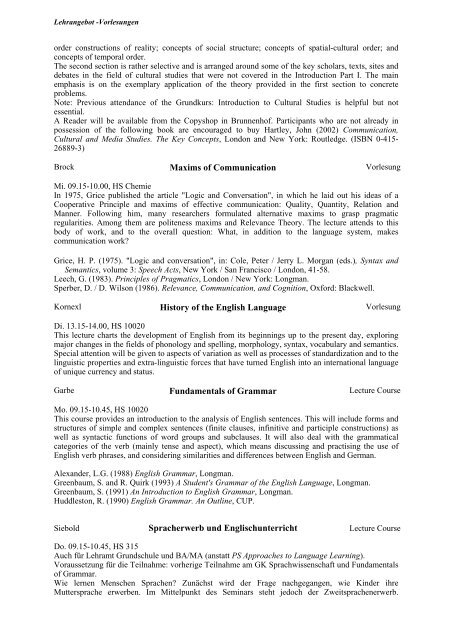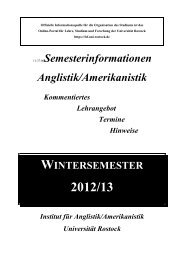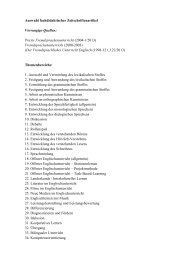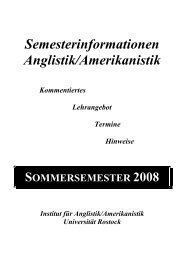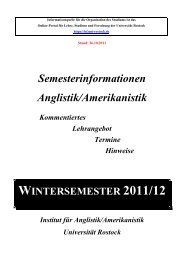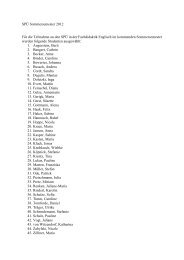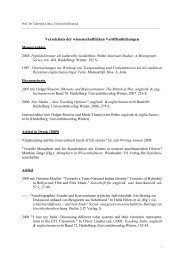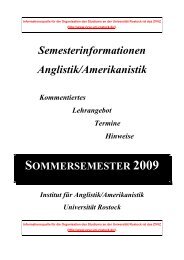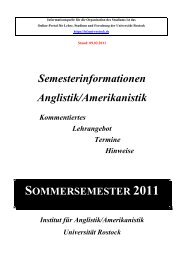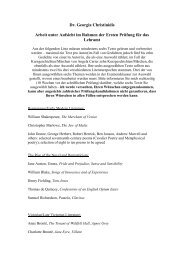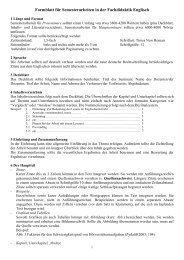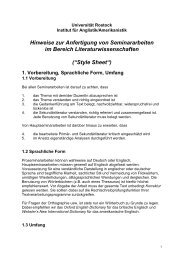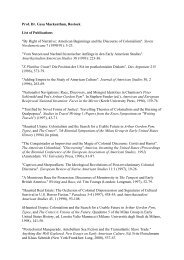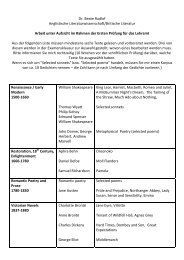SOMMERSEMESTER 2004 - Institut für Anglistik/Amerikanistik
SOMMERSEMESTER 2004 - Institut für Anglistik/Amerikanistik
SOMMERSEMESTER 2004 - Institut für Anglistik/Amerikanistik
You also want an ePaper? Increase the reach of your titles
YUMPU automatically turns print PDFs into web optimized ePapers that Google loves.
Lehrangebot -Vorlesungen<br />
order constructions of reality; concepts of social structure; concepts of spatial-cultural order; and<br />
concepts of temporal order.<br />
The second section is rather selective and is arranged around some of the key scholars, texts, sites and<br />
debates in the field of cultural studies that were not covered in the Introduction Part I. The main<br />
emphasis is on the exemplary application of the theory provided in the first section to concrete<br />
problems.<br />
Note: Previous attendance of the Grundkurs: Introduction to Cultural Studies is helpful but not<br />
essential.<br />
A Reader will be available from the Copyshop in Brunnenhof. Participants who are not already in<br />
possession of the following book are encouraged to buy Hartley, John (2002) Communication,<br />
Cultural and Media Studies. The Key Concepts, London and New York: Routledge. (ISBN 0-415-<br />
26889-3)<br />
Brock Maxims of Communication Vorlesung<br />
Mi. 09.15-10.00, HS Chemie<br />
In 1975, Grice published the article "Logic and Conversation", in which he laid out his ideas of a<br />
Cooperative Principle and maxims of effective communication: Quality, Quantity, Relation and<br />
Manner. Following him, many researchers formulated alternative maxims to grasp pragmatic<br />
regularities. Among them are politeness maxims and Relevance Theory. The lecture attends to this<br />
body of work, and to the overall question: What, in addition to the language system, makes<br />
communication work?<br />
Grice, H. P. (1975). "Logic and conversation", in: Cole, Peter / Jerry L. Morgan (eds.), Syntax and<br />
Semantics, volume 3: Speech Acts, New York / San Francisco / London, 41-58.<br />
Leech, G. (1983). Principles of Pragmatics, London / New York: Longman.<br />
Sperber, D. / D. Wilson (1986). Relevance, Communication, and Cognition, Oxford: Blackwell.<br />
Kornexl History of the English Language Vorlesung<br />
Di. 13.15-14.00, HS 10020<br />
This lecture charts the development of English from its beginnings up to the present day, exploring<br />
major changes in the fields of phonology and spelling, morphology, syntax, vocabulary and semantics.<br />
Special attention will be given to aspects of variation as well as processes of standardization and to the<br />
linguistic properties and extra-linguistic forces that have turned English into an international language<br />
of unique currency and status.<br />
Garbe Fundamentals of Grammar Lecture Course<br />
Mo. 09.15-10.45, HS 10020<br />
This course provides an introduction to the analysis of English sentences. This will include forms and<br />
structures of simple and complex sentences (finite clauses, infinitive and participle constructions) as<br />
well as syntactic functions of word groups and subclauses. It will also deal with the grammatical<br />
categories of the verb (mainly tense and aspect), which means discussing and practising the use of<br />
English verb phrases, and considering similarities and differences between English and German.<br />
Alexander, L.G. (1988) English Grammar, Longman.<br />
Greenbaum, S. and R. Quirk (1993) A Student's Grammar of the English Language, Longman.<br />
Greenbaum, S. (1991) An Introduction to English Grammar, Longman.<br />
Huddleston, R. (1990) English Grammar. An Outline, CUP.<br />
Siebold Spracherwerb und Englischunterricht Lecture Course<br />
Do. 09.15-10.45, HS 315<br />
Auch für Lehramt Grundschule und BA/MA (anstatt PS Approaches to Language Learning).<br />
Voraussetzung für die Teilnahme: vorherige Teilnahme am GK Sprachwissenschaft und Fundamentals<br />
of Grammar.<br />
Wie lernen Menschen Sprachen? Zunächst wird der Frage nachgegangen, wie Kinder ihre<br />
Muttersprache erwerben. Im Mittelpunkt des Seminars steht jedoch der Zweitsprachenerwerb.


